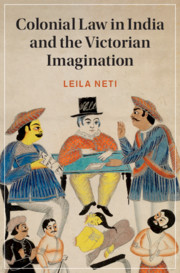Book contents
- Colonial Law in India and the Victorian Imagination
- Cambridge Studies in Nineteenth-Century Literature and Culture
- Colonial Law in India and the Victorian Imagination
- Copyright page
- Dedication
- Contents
- Acknowledgments
- Introduction
- Part I Criminality
- Chapter 1 “Power Able to Overawe Them All”
- Chapter 2 The Social Life of Crime
- Part II Temporality
- Part III Adoption and Inheritance
- Afterword
- Notes
- Bibliography
- Index
Chapter 2 - The Social Life of Crime
Charles Dickens’s Great Expectations and Philip Meadows Taylor’s Confessions of a Thug
from Part I - Criminality
Published online by Cambridge University Press: 02 April 2021
- Colonial Law in India and the Victorian Imagination
- Cambridge Studies in Nineteenth-Century Literature and Culture
- Colonial Law in India and the Victorian Imagination
- Copyright page
- Dedication
- Contents
- Acknowledgments
- Introduction
- Part I Criminality
- Chapter 1 “Power Able to Overawe Them All”
- Chapter 2 The Social Life of Crime
- Part II Temporality
- Part III Adoption and Inheritance
- Afterword
- Notes
- Bibliography
- Index
Summary
Chapter Two, “The Social Life of Crime: Charles Dickens’s Great Expectations and Philip Meadows Taylor’s Confessions of a Thug” reads the oppositional evolution of criminal justice in England and India by comparing the two novels. I begin with the observation that the movement toward rehabilitation and the humanization of the criminal in nineteenth century England occurs in tandem with the rise of corporal punishment and penal transportation in India. Taking the two novels as instances of this contradictory impulse, I examine the figure of the thug as a cipher for racialized fears of Indian criminality. In particular, I look at representations of paternity and masculinity within both novels. I show that Abel Magwitch becomes humanized in Dickens’s novel by taking on the mantle of fatherhood for Pip. By contrast, Ameer Ali is condemned for his paradigmatic inability to foster a viable childhood. I argue that criminality emerges within a Victorian matrix of race and patriarchy in which to be a father, or father figure, is to be properly human.
Keywords
- Type
- Chapter
- Information
- Colonial Law in India and the Victorian Imagination , pp. 63 - 94Publisher: Cambridge University PressPrint publication year: 2021

